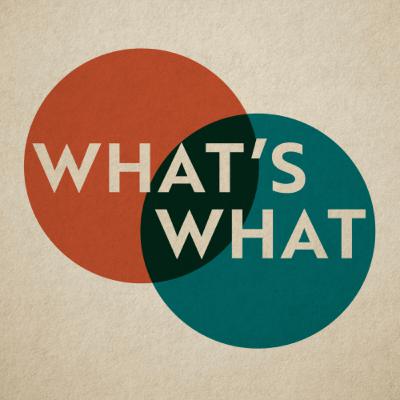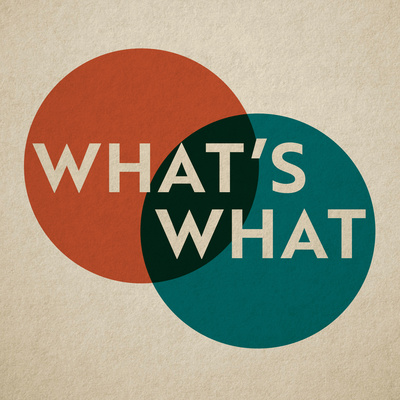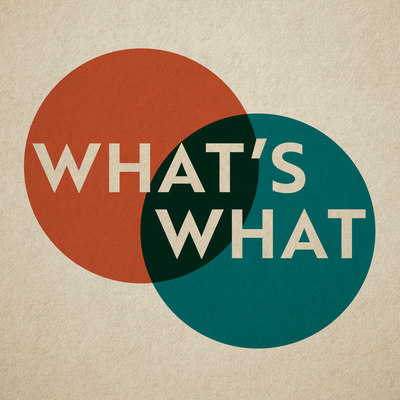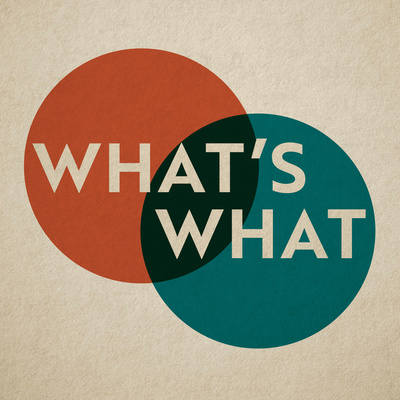Discover What's What
What's What

What's What
Author: Vayus Media
Subscribed: 13Played: 49Subscribe
Share
© Vayus Media
Description
Fusing counterculture ideas, Earth-conscious living, and traditional Eastern philosophy and spirituality; host Chris Siracuse takes a critical look at the progressive ideology shaping mainstream industrialized society and explores alternative paths for the development of the modern world.
47 Episodes
Reverse
The assassination of President John F. Kennedy in November of 1963 was one of the most significant events of the 20th century. Over the past 60 years, a slew of stories have been told about who killed the president and why - elements of the CIA and American military, the Soviets, Castro and the Cubans, the mafia, or some strange amalgamation of them all? One thing we know for sure is the story the Warren Commission tells about Lee Harvey Oswald being the one and only person involved in the assassination is dubious at best.
In this episode of What's What, we focus on the military-industrial complex, the CIA, and the coup d'état theory of JFK's assassination; citing Oliver Stone's 1991 film "JFK". The second half of the episode takes a detour into power and privilege dynamics in the United States and how racial grievances are fueling misguided public policy.
What’s What is produced by Vayus Media - click on the links below for more content about counterculture ideas, Earth-conscious living, and Eastern philosophy and religion:
Website & Blog
YouTube @vayusmedia
Instagram @vayusmedia
Instagram @chrissiracuse
Facebook @VayusMedia
Twitter @VayusMedia
TikTok @vayusmedia
Vayus Media LinkedIn
What’s What LinkedIn
Death is a topic that is often avoided or ignored, but it is one of the few things that is absolutely certain for living beings. In this episode of What's What, Rushi and Chris discuss Eastern and Western perspectives on death, the moral problems with suicide and medically assisted dying, and the spiritual aspects of the dying process.
“When death comes, it's just like winter. We don't say, 'There ought not to be winter.' That the winter season, when the leaves fall and the snow comes, is some kind of defeat, something which we should hold out against. No. Winter is part of the natural course of events. No winter, no summer. No cold, no heat."
- Alan Watts
Warning: This episode contains material that may be disturbing for some listeners and viewers.
What’s What is produced by Vayus Media - click on the links below for more content about counterculture ideas, Earth-conscious living, and Eastern philosophy and religion:
Website & Blog
YouTube @vayusmedia
Instagram @vayusmedia
Instagram @chrissiracuse
Facebook @VayusMedia
Twitter @VayusMedia
TikTok @vayusmedia
Vayus Media LinkedIn
What’s What LinkedIn
For better or worse, the introduction of ChatGPT to the public was a monumental moment for the development of the human species. AI technologies will re-shape every aspect of society and they are ushering in a new era of creative expression - what will this new world look like and how will we maintain the spiritual essence of the human experience as machines take more and more control of our lives? In this episode of What's What, Rushi and Chris offer their take and explore ways to utilize these tools without losing our humanity.
What’s What is produced by Vayus Media - click on the links below for more content about counterculture ideas, Earth-conscious living, and Eastern philosophy and religion:
Vayus Media Website & What’s What Blog
YouTube @vayusmedia
Instagram @vayusmedia
Instagram @chrissiracuse
Facebook @VayusMedia
Twitter @VayusMedia
TikTok @vayusmedia
Vayus Media LinkedIn
What’s What LinkedIn
On the surface, propaganda is relatively simple - it is the dissemination of information (facts, arguments, rumors, half-truths, or lies) to influence public opinion and it is often used to promote a specific political cause or point of view. But the discussion around propaganda becomes much more complex when we start to ask questions about intent. It is easy to look at opposing view points and say we know the intent behind them and label them as propaganda, disinformation, or misinformation - but it's much harder to look at ourselves and question our own intent and our own beliefs. In this episode of What's What, Rushi and Chris sift through their biases and beliefs about the world, and try to reach a shared understanding of truth.
What’s What is produced by Vayus Media - click on the links below for more content about counterculture ideas, Earth-conscious living, and Eastern philosophy and religion:
YouTube @vayusmedia
Instagram @vayusmedia
Instagram @chrissiracuse
Facebook @VayusMedia
Twitter @VayusMedia
TikTok @vayusmedia
Vayus Media LinkedIn
What’s What LinkedIn
Taoism (or Daoism) emerged in China around 500 BCE when the philosopher Lao Tzu wrote the Tao Te Ching. The word Tao has many translations but one of the most common is "the flow of nature" or according to Alan Watts "the course of things". At the heart of Taoist philosophy is the belief that the best way to maintain order is to not try to maintain order. By relinquishing our desire for control, we create space for spontaneity and adaptability. Just as a river flows effortlessly, finding its own path around obstacles, Taoism invites us to navigate life's challenges with grace and flexibility. Rather than resisting the natural flow, we learn to flow with it.
In part three of our mini-series on Eastern philosophy, Rushi and Chris discuss the Tao and how it relates to political and economic systems like communism and free market capitalism. The second half of the show gets deep into Taoism and transgenderism, and what the "flow of nature" truly means when it comes to the free will of human beings. Is it possible for humans to have "unnatural" thoughts and do "unnatural" things, or is everything we do natural because we are part of the natural world? Tune in to find out.
"The great Tao flows everywhere, both to the left and to the right.It loves and nourishes all things but does not lord it over them.And when good things are accomplished it lays no claim to them."
- Lao Tzu from the Tao Te Ching
What’s What is produced by Vayus Media - click on the links below for more content about counterculture ideas, Earth-conscious living, and Eastern philosophy and religion:
YouTube @vayusmedia
Instagram @vayusmedia
Instagram @chrissiracuse
Facebook @VayusMedia
Twitter @VayusMedia
TikTok @vayusmedia
Vayus Media LinkedIn
What’s What LinkedIn
India the 6th-5th centuries BCE... according to legend, the Hindu prince Siddhartha Gautama renounced his position and wealth to seek enlightenment as a spiritual ascetic. It is said that he reached enlightenment while meditating under a bodhi tree, and thus became the Buddha. He began to preach his path to others and the religion of Buddhism was born.
In part two of our mini-series on Eastern philosophy, Rushi and Chris delve into the core beliefs of Buddhism such as the Four Noble Truths, Aldous Huxley and Alan Watts's perspective on the teachings, and the modern importance of one of the world's most popular religions.
What’s What is produced by Vayus Media - click on the links below for more content about counterculture ideas, Earth-conscious living, and Eastern philosophy and religion:
YouTube @vayusmedia
Instagram @vayusmedia
Instagram @chrissiracuse
Facebook @VayusMedia
Vayus Media LinkedIn
What’s What LinkedIn
Hinduism is thought to be the world's oldest religion, and it includes many different systems of philosophy, belief, and ritual. But to some, Hinduism is not a religion at all, but rather a lifestyle or simply a way of being. In part one of our mini-series on Eastern philosophy, Rushi and Chris dig into the history, myths, and influence of Hinduism; and how these ancient beliefs are shaping the modern world. What lessons can we learn from Hindu texts like the Vedas, the Ramayana, and the Bhagavad Gita? Tune in to find out.
What’s What is produced by Vayus Media - click on the links below for more content about counterculture ideas, Earth-conscious living, and Eastern philosophy and religion:
YouTube @vayusmedia
Instagram @vayusmedia
Instagram @chrissiracuse
Facebook @VayusMedia
Vayus Media LinkedIn
What’s What LinkedIn
Two questions are at the core of discussions about sustainable agriculture, food, and health (individual and ecosystem health): Where does our food come from and how is it grown or produced? In this episode of What's What, Rushi and Chris dig into industrial food systems and explore solutions to the challenges around producing enough food to feed the growing population of the planet, while also keeping ourselves healthy and our environment clean. They touch on regenerative and biodynamic farming, permaculture, food sovereignty, and local food production.
What’s What is produced by Vayus Media - click on the links below for more content about counterculture ideas, Earth-conscious living, and Eastern philosophy and religion:
YouTube @vayusmedia
Instagram @vayusmedia
Instagram @chrissiracuse
Facebook @VayusMedia
Vayus Media LinkedIn
What’s What LinkedIn
Lawrence Blair is an anthropologist, author, explorer, and filmmaker. He is the writer, presenter, and co-producer of "Ring of Fire: An Indonesian Odyssey" (1988) a series of five documentary films following the decade-long journey of Lawrence and his brother Lorne, and their search for the lost cultures and forgotten traditions of Indonesia. He is also the author of the 1976 book "Rhythms of Vision: The Changing Patterns of Belief" in which he explores sacred geometry, energy, chakras, and spiritual planes of existence.
In this episode of What's What, Rushi and Chris visit Pak Lawrence ("Pak" means "sir" or "mister" in Indonesian) at his home in Bali to discuss a range of topics including his connection with Aldous Huxley, science and mysticism, the counterculture movements of the 1960s and today, and his adventures in Indonesia.
What’s What is produced by Vayus Media - click on the links below for more content about counterculture ideas, Earth-conscious living, and Eastern philosophy and religion:
YouTube @vayusmedia
Instagram @vayusmedia
Instagram @chrissiracuse
Facebook @VayusMedia
Vayus Media LinkedIn
What’s What LinkedIn
In this episode of What's What, Chris sits down with author and philosopher Martin O'Toole to discuss his upcoming book, How To Die Happy. Cherry-picking Eastern philosophies like Taoism, Confucianism, and Buddhism - and introducing mindfulness, psychological practices, and tales of the miraculous healing power of ayahuasca - How To Die Happy distills the secrets to living and dying well. Part curated wisdom, part handbook, part memoir, this inspirational text offers a blend of ancient lessons, stories of real-life suffering, and a host of practical utilities to enjoy a vibrant and contented life.
The Internet is a digital abstraction of physical life and reality, and this abstraction continues to dominate more and more of our lives. In this episode of What's What, Rushi and Chris discuss social media, the metaverse, and the effects of technology on the individual mind and society as a whole.
In this episode, Rushi and Chris dig a little deeper on Alan Watts, the Sausalito Houseboat Summit of 1967, and the vision of a tribal future as the ultimate manifestation of dropping out. They also discuss the hyper-commercialized spiritual movements in Bali and the current state of the counterculture movement.
Alan Watts is best known for being one of the first to interpret Eastern philosophy and religion for Western audiences, and has been described as having the gift of ‘writing beautifully the unwritable’. Watts combined Taoist, Buddhist, and Hindu teachings with his own personal philosophy - forming a unique, eloquent, and inspiring perspective on humankind, nature, and the universe. In this episode, Rushi and Chris focus on Watts’s thoughts on the course of nature and returning to our ‘original intelligence’.
In part two, Rushi and Chris discuss the legacy of Leary and Dass, the current state of the ‘revolution of consciousness’, and the next chapter in the story of psychedelic counterculture with a new generation carrying the torch.
Timothy Leary most commonly evokes images from the out of control psychedelic experimentation of the 1960s, and Ram Dass is often associated with the new age spiritual movements emerging in the west around that same time. But before they were counterculture icons, they were reputable psychologists and professors at Harvard University, and among the very first western researchers to study psilocybin. In part one of a two part series, Rushi and Chris tell the beginning of their story and how their friendship sparked a cultural revolution.
In this episode of What's What, Rushi and Chris introduce Krishnamurti and his connection to Aldous Huxley, and discuss their philosophy around alternative education. Themes through the show - What do we think we know and why do we think we know it? What are human beings for?
At the core of industrialized society is an economic idea based on scarcity. But Buckminster Fuller, Terence McKenna, and others presented an alternative perspective - abundance. In this episode of What’s What, Rushi and Chris continue discussing ‘Food of the Gods’ and introduce Fuller’s ‘The Operating Manual for Spaceship Earth’.
In this episode of What's What: human evolution, psilocybin mushrooms, and Terrence McKenna’s book ‘Food of the Gods’.
Looking to the work of George Orwell (‘Animal Farm’ and ‘1984’) and Aldous Huxley (‘Brave New World’ and ‘Island’) to understand how pharmaceutical companies are using tyrannical tactics to trap us in an industrialized healthcare system.
In the very first episode of What’s What, Rushi and Chris discuss the inspiration for the show - Aldous Huxley’s 1962 novel, ‘Island’, his final work before his death and the utopian counterpart to the 1932 dystopian novel, ‘A Brave New World’.










